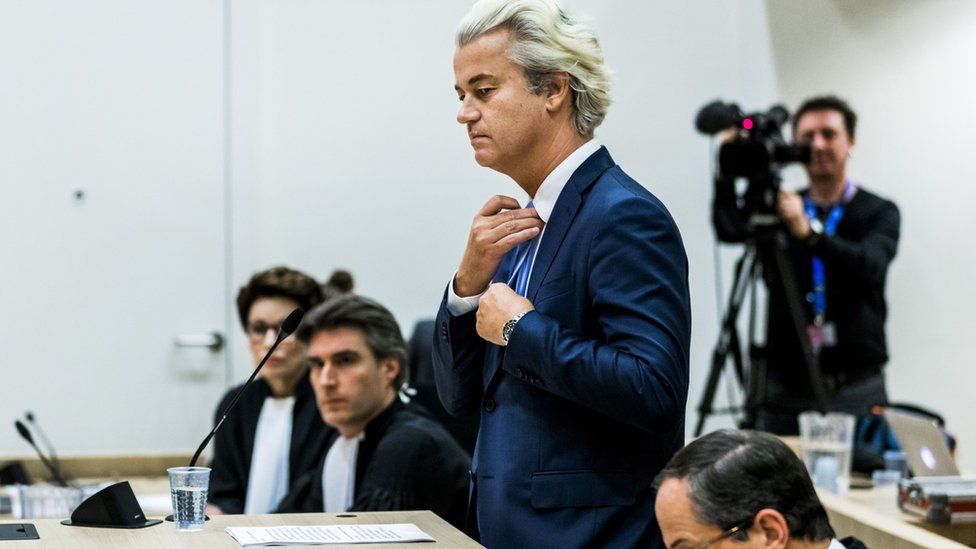Are Dutch voters really turning to populist Geert Wilders?
- Published

Dutch voters choose a new government in March 2017 and if the polls are right, the right-wing Freedom Party (PVV) of populist leader Geert Wilders is surging ahead of his rivals and is set to win 35 seats.
A quick calculation suggests almost three million people would vote for Geert Wilders. Anti-Islam and anti-immigration, Mr Wilders was found guilty on Friday of inciting discrimination and of insulting a group of Moroccan immigrants, although no penalty was imposed.
So where are the PVV's voters?
The traditional method for tracking down PVV supporters down generates zero results, says political scientist Andre Krouwel.
"The PVV has no party organisation or local branches, no member or activist base, he is the only member of the party."
A party source recommends a cosy pub opposite parliament to find supporters. But when the owners discover I am a journalist, they become edgy and are reluctant to talk politics.
The Twitter hashtag #stempvv (vote PVV) throws up plenty of anonymous profile pictures - a car, a sunflower and an angry cartoon character.
Many PVV supporters say they would prefer not to talk to journalists - a combination of distrust and fear of being stigmatised or misrepresented.
"It's socially not acceptable to vote PVV, they're considered extremist-right wing," journalist Wierd Duk told the BBC.
"They would be excluded from their social circle, work, they'd lose friends, promotion opportunities. If you out yourself as a PVV supporter you're seen as a threat to the dominant ideology of tolerance and consensus."
Mr Duk invited Wilders supporters to email him to explain their motivation.
"I expected 'hate Islam, love Wilders' kind of thing, that's how the PVV voter is framed, the angry white man, but it's much more complex now. It's entrepreneurs, teachers, Church leaders, people who feel the traditional parties on all sides of the spectrum simply aren't listening to their concerns.
"Whereas mainstream politicians think it's a matter of human decency not to talk about whole sections of the population as a threat to society, Geert Wilders doesn't have such reservations."
His election pledges include a ban on the Koran and a plan to deport repeat offenders who hold dual nationality. He was put on trial for inciting hatred when he asked a room full of supporters if they wanted "more or fewer" Moroccans in the Netherlands.
When the government recently proposed a partial ban on the Islamic full veil in some public areas (worn by some 300 women in the Netherlands) it was seen by many as a cynical effort to claw voters back from Geert Wilders.
Health Minister Edith Schippers said recently: "We stand for freedom and those who don't accept that do not belong here".
Who are Wilders' elusive supporters?
It took some effort to track down proud PVV supporters.
All of them speak of a loss of faith in the mainstream, of broken promises and politically correct tip-toeing around the real issues affecting their lives, primarily radical Islam, immigration and the influence of the EU.
"Wilders is the only politician I trust. The others don't take us seriously", explains graduate Bastiaan Sietsema. "They say Wilders is the problem but actually he's a product of this neglect.
"Muslims have a completely different view on society, gender, sexuality, different values. In some cities whites are a minority now. People don't feel at home. They feel unsafe."
Does Bastiaan know any Muslims? "No." He lives in a village. His clearly well-researched views mostly come from the internet - "opinion pieces".
Gert Jan Mulder describes himself as a farmer, economist and father of six. "It's very simple, he's always right," he explains. "His core business is his stance regarding Islam. He's a visionary."
Eventually Geert Wilders' views will be vindicated, he believes, pointing to jihadists posing as refugees to enter Europe, the UK voting for Brexit and Donald Trump's victory in the US.
But not all his supporters are so in thrall.
"His approach is often too aggressive." says Peter van Dijken, who writes for an online magazine. "Even if he does win power, there's no way he'd be able to introduce all the major plans he has because of our coalition system in the Netherlands. But people like me are fed up. Other parties need to realise this."
Will the March election be different?
Geert Wilders' support has morphed beyond the core, white working-class.
He homes in on, and highlights, popular concerns - the influence of non-Dutch people on Dutch society, loss of culture, loathing of mainstream parties' apparent inability or unwillingness to acknowledge these issues.
And he presents himself as the only solution, astutely showing he is prepared to venture into territory where others are afraid to tread.
His approach appears to be paying political dividends, although until now he has struggled to translate high poll ratings into seats in parliament.
It is one thing to express discontent, but perhaps another when you are inside a polling booth choosing who is best equipped to run the country.
But this time might be different. No longer does anyone underestimate the ability of populist leaders to harness the voters' desire to be heard.
- Published23 November 2016